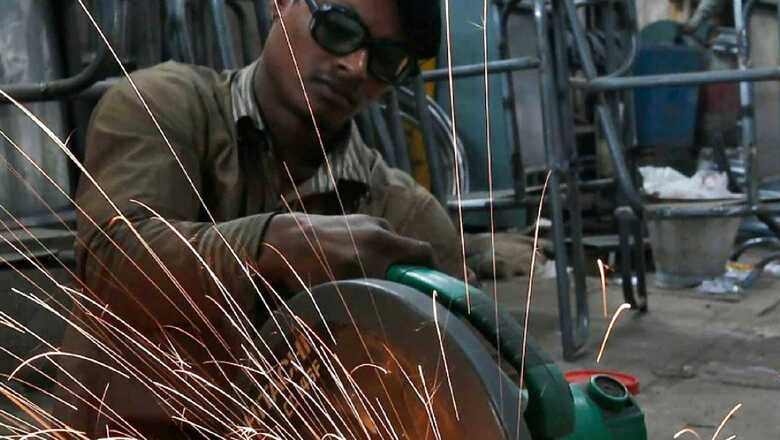
views
Key industrial sectors such as steel and textiles have witnessed phenomenal growth in revenue and profitability in the past 15-18 months and are performing in line with the market’s expectations. However, the key sectors are likely to see some profitability dip as input costs rise amid high inflation rates across the world, according to a report by India Ratings (Ind-Ra).
The rating agency has revised its outlook to neutral for the mid-corporate sector for the remainder of the financial year 2022-23 from improving and has also maintained a ‘stable’ rating outlook for FY23.
Textiles
India Ratings said the textile sector’s profitability in terms of Ebitda margins has remained stable at 7.90 per cent in 1HFY23 (7.70 per cent in FY22). The marginally better margins were on account of a rise in the raw material prices and thereby, the industry fetching inventory gains. Ebitda stands for earnings before interest, tax, depreciation and amortisation.
The interest coverage has also been consistent in 1QFY23, backed by an improvement in the absolute Ebitda. With the increase in cotton prices, the Ebitda margins, however, are expected to decline. The agency expects ongoing capex to affect credit metrics in FY23.
Steel
The steel sector’s Ebitda margin has been subdued at 5.5 per cent in 1QFY23 (6.8 per cent in FY22), due to a correction in steel prices post the export duty levy and higher coking coal costs.
“The interest coverage sustained in 1QFY23, compared to 2HFY22, and is on an improving trend due to an increase in absolute EBITDA and deleveraging. The sector might also focus on debt-led capex to support the growing demand. The later coupled with stressed margins can put pressure on the credit profile of the sector,” India Ratings said in its report.
Auto Ancillary
The margins declined by 106 bps in 1QFY23 as a result of increased input costs. Moreover, companies are selling large quantities to established MNCs, leading to customer concentration and price escalation to cover the increased input costs.
“With the improvement in the absolute Ebitda, the interest coverage improved in 1QFY23. Ind-Ra expects the sector to perform better in 2HFY23 on the back of pent-up demand from the festive season. Also, the impact of chip shortage is getting partly mitigated as additional capacities of chip manufacturers are available for production coupled with better supply chain management. However, auto ancillaries with large exposure to exports (especially to Europe and some emerging markets) could experience challenges of a lower demand,” the agency added.
Pharmaceuticals
The pharmaceutical sector’s Ebitda margins improved marginally in 1QFY23, led by cost optimisation. Ind-Ra expects EBITDA margins to get affected by the unprecedented price erosion witnessed in the US market for generic medicines as a result of intense competition.
“The interest coverage also improved marginally in 1QFY23 due to an expansion in the absolute EBITDA and debt repayment. There might be a marginal increase in capex due to incremental capacity addition funded through debt, which could affect the credit metrics,” Ind-Ra said.
Hotels
The profitability seems to be back on track with the Ebitda margins growing in the annualised 1QFY23, which was also marginally higher than the average margins being booked during the pre covid period.
Ind-Ra expects the industry to further grow at similar levels as travel restrictions have eased out with appropriate vaccination drives and the resultant reduction of the covid impact. The 1QFY23 result are also in line with Ind-Ra’s prediction seeing the ease in travel restrictions. “Also, the liquidity support extended in the budget, in the form of Guaranteed Emergency Credit Lines of Rs 50 billion (Rs 5,000 crore), can be seen to have materialised. Another Rs 500 billion (Rs 50,000 crore) in the form of Emergency Credit Line Guarantee Scheme has been extended which is also expected to provide further comfort.”
Consumer Foods
The profitability in annualised 1QFY23 has sustained at levels seen during FY22. However, the industry is yet to get back to the pre covid levels. The interest coverage improved in 1QFY23 , majorly because of the lesser utilisation of the short-term limits backed by no major working capital build-up. “However, the risk of input cost related inflation continues and the resultant inability to pass it to distributors. Ind-Ra expects the industry to perform in a similar manner in FY23,” it said.
Engineering Procurement & Construction
The Ebitda margin remained stable in 1QFY23 as the majority contracts bid by mid-sized entities in FY22 either factor in elevated prices or carry variable prices. However, if volatility in raw material prices continues, small-scale players could face margin pressure. Overall, Ind-Ra expects the margins to remain stable in FY23 while the orderbook could grow on the back of improved government spending.
Engineering
The Ebitda margins declined marginally in 1QFY23, due to increasing input costs. The margins might improve due to a diminution in the cost of steel which is a major raw material for the sector. The interest coverage normalised to pre-covid level in 1QFY23, assuming that the working capital credit facilities have been optimally utilised to support its operations. “The sector might look to incur capex to match the growing demand which might put some pressure on the credit metrics,” India Ratings said in the report.
Read all the Latest Business News here




















Comments
0 comment